Content
Potatoes are a vegetable crop that is widespread throughout the world. Breeders have developed many varieties of this vegetable, which differ in taste, color, shape and ripening period. For an early harvest, early ripening varieties are suitable. And for long-term storage, it is better to plant mid-season and late species. One of these is the Skarb potato, whose name translates as treasure. We will give a detailed description of this variety, consider its photo and reviews of gardeners.
Origin
Potato variety Scarb got its start in Belarus. Its authors are Z.A Semenova, A.E. Zuikov, E.G. Ryndin and L.I. Pishchenko. Breeders brought it to the Research Institute of Potato and Horticulture in 1997. And in 2002, the variety was officially included in the state register of Russia. Now it is possible to import it into the country, to multiply and sell planting material.
Potatoes are suitable for planting in the Central, Ural, North-West and Volga-Vyatka regions of the Russian Federation. It is also popular in Moldova, Belarus and Ukraine.
Characteristic
Scarb potatoes have a medium ripening period and have a table purpose. Compared to early varieties, harvesting takes place 25-30 days later. The growing season averages 95-110 days.
Description of the plant and tubers
The variety is characterized by the formation of semi-spreading and medium-sized bushes, the height of which can reach 60 cm. The plant is covered with small, oval-oblong leaves with smooth edges.
Snow-white inflorescences of ten flowers are formed on light green stems. Pollination occurs naturally. Sometimes after it, green berries are formed, which usually crumble. They do not affect the yield.
Each bush can produce 12 to 15 tubers. They have an oval shape and a smooth golden skin on which small eyes can be found. The flesh of the potato is tender, rich yellow. Tuber weight varies from 160 to 250 g.
Since the sugar content of Scarb potatoes is 0.4%, it has a sweetish taste. The vegetable contains no more than 18% starch, so it is widely used in cooking. Chips are made from potatoes, added to salads and soups.
Benefits
Advantages of Scarb potatoes:
- resistance to drought and low temperatures;
- excellent presentation;
- good productivity;
- can be stored for a long time;
- excellent taste;
- resistance to many diseases.
Potatoes do not crumble during cooking, as they contain a large amount of starch. The tubers of Scarb potatoes are smooth and large, so this variety is in demand, and many gardeners grow it for sale.
disadvantages
This variety also has several disadvantages:
- vulnerability to late blight of tubers and leaves;
- may be affected by ring rot;
- seedlings may appear unevenly and for a long time;
- a young plant is sensitive to waterlogging;
- before planting, the tubers must be germinated.
Cut potatoes are not used as seed. If you provide your potatoes with regular maintenance, you can avoid many problems.
Productivity and ripening time
For economic purposes, this is a table variety, which belongs to the middle late.From the moment of germination to full maturation of potato tubers, no more than 85-95 days pass.
Scarb is high-yielding variety... Gardeners get from 12 to 15 tubers from one bush. With proper care, up to 7 kg of potatoes can be harvested from a square meter of a garden bed, and up to 70,000 kg from a hectare of land.
Planting potatoes
To get a bountiful harvest, you need to study the features of planting this variety.
Scarb potatoes are planted in heated soil. The air temperature should not be lower than + 20 ° С, and the ground temperature should not be lower than 10 ° С. Planting usually begins in the second half of May.
Site selection and processing
To plant a plant, you must choose a sunny and dry area with a flat surface. The vegetable grows well in fertile and slightly acidic soil. Plantain and clover usually grow on such land.
The best predecessors of this crop are legumes, cucumbers, onions, cabbage and winter rye.
The area for Scarb potatoes begins to be prepared in the fall. It is dug to a depth of 25-30 cm and cleaned of weeds and roots. At the same time, the following fertilizers are applied to the soil (per 1 m2):
- compost or humus - 1 bucket;
- superphosphate - 4-5 tbsp. l .;
- potassium salt - 2 tbsp. l.
Add 1 bucket of sand to the clay soil. In the spring, nitrogen fertilizers are applied to the site.
Tuber preparation
A month before planting, the tubers are taken out of the basement. They are carefully examined, rotten and damaged ones are thrown away. Healthy potatoes of about the same size are suitable for planting.
To germinate the tubers faster, they are removed for 2-3 days in a room where the air temperature is in the range from 35 to 40aboutC. Then they are folded to the bottom of the box and placed in a lighted place with room temperature. When the sprouts are 3 to 4 cm tall, the potatoes can be planted.
But before planting it, it is advisable to spray it with Prestige or a solution of copper sulfate. To prepare it, you need 1 tsp. add substances to 3 liters of water and mix thoroughly. Such treatment is the prevention of phytosporosis, which can affect the Skarb potato variety.
Landing rules
Potatoes are planted to a depth of 8-10 cm at a distance of 30 to 35 cm from each other.At least 60 cm should be left between the rows, so that in the future it is convenient to look after the crop.
In accordance with the planting scheme, they dig trenches or make holes. The rows are arranged in the direction from south to north. So the landings will be better warmed up and illuminated.
If the site has not been fertilized since autumn, a handful of humus and ash is added to each hole. Also, under each bush, you can add a teaspoon of superphosphate and potassium salt. Then the tubers are placed in the holes with sprouts up and covered with a layer of soil.
Care features
After planting, the Scarb potato variety needs attention and careful care. To do this correctly, you need to familiarize yourself with the features of watering, weeding, hilling and feeding.
Loosening and weeding
For the entire growing season, it is recommended to loosen the soil 3 times. It is convenient to combine it with weeding. Approximately 7-10 days after planting in a bed planted with potatoes, you need to walk with a rake. This will help get rid of young weeds.
After the sprouts appear, the area between the rows must be loosened again. This will make it easier for water and air to reach the potato roots.
Hilling
Hilling is the process of backfilling the lower part of the plant with fresh and loose soil. This contributes to a 20% increase in yield. The event should be held in the morning or evening after rain. The weather should be overcast or cloudy.
For the entire season, the Scarb potato bushes are spud three times:
- When the seedling height reaches 10 cm.
- Two weeks after the first time.
- During flowering.
Hilling promotes the formation of new roots and tubers.The soil is saturated with oxygen, so the growth of root crops is enhanced.
Top dressing
Potatoes of this variety are fed by spraying the aboveground part of the plant or by applying fertilizer to the hole. During the entire growing season, the procedure should be carried out three times:
- During the formation of tops. Prepare a solution of 300 g of ash and 10 liters of water, spray the plant. Or they make an infusion of weeds and water it.
- During bud formation. Potatoes are watered with a solution of 3 tbsp. l. ash, 1 tbsp. l. potassium sulfate and 10 liters of water. Per meter of the garden bed - 1 liter of fertilizer.
- During flowering. Under each bush, make 2 tbsp. l. superphosphate, or pour it with a solution of 1 glass of mullein, 2 tbsp. l. nitrophosphate and 10 liters of water. One plant - 0.5 liters of fertilizer.
When applying dry fertilizers under a bush, it must be hilled. After rain or watering, the mixture will dissolve in the soil.
Watering
For the entire period of growth and development, the plant must be watered at least three times. In dry and hot weather, irrigation should be carried out as the soil dries out. Watering Scarb potatoes is carried out at the rate of 10 liters of water per 1 m2... If the summer is cloudy and rainy, you can limit yourself to loosening and weeding the soil. Watering must be stopped 15 days before harvest.
Diseases and pests
Scarb potatoes are resistant to leaf mosaic, viral diseases, scab, wet and dry rot. It is almost immune to golden nematode and blackleg. But the leaves can be affected by late blight, which is manifested by the darkening of the leaves and their death. Ring rot can sometimes form on the tubers, which can be recognized by yellow and brown spots.
In order not to lose the harvest, it is recommended to carry out preventive treatment of the bushes. Spraying with a solution of copper sulfate and high hilling protects from the appearance of late blight. Treatments must be carried out before flowering.
Ring rot can be prevented by applying potash fertilizers. Do not cut the root crop before planting.
If the Colorado potato beetle has appeared on the Scrub potato, it is better to collect it by hand. Chemical preparations should be used only in case of mass appearance of pests, as they can change the taste of potatoes. The most common insecticides are: Corado, Prestige, Aktara, On the Spot and Prestige.
Collection and storage
Watering is stopped 15 days before harvesting, and the aerial part of the plant is mowed, leaving short stems without foliage. The tops are harvested and burned. Cleaning is best done in dry and warm weather.
The potatoes are carefully dried and sorted. Roots damaged by digging or showing signs of disease should be set aside separately. Selected potatoes are removed for 2-3 weeks in a dry room for final ripening.
For main storage, Scarb is removed to a room where the air temperature is maintained at a level of 2 - 5aboutC, and the humidity is 80 - 85%. Potatoes for planting are folded in a separate container.
Gardeners reviews
Conclusion
Belarusian potatoes Skarb have a sweetish taste and golden color, so this variety attracts the attention of many gardeners. Aromatic dishes made from it will satisfy any gourmet. But this potato variety is picky about growing conditions. Therefore, a bountiful harvest can be harvested only if all recommendations for care and agricultural technology are followed.
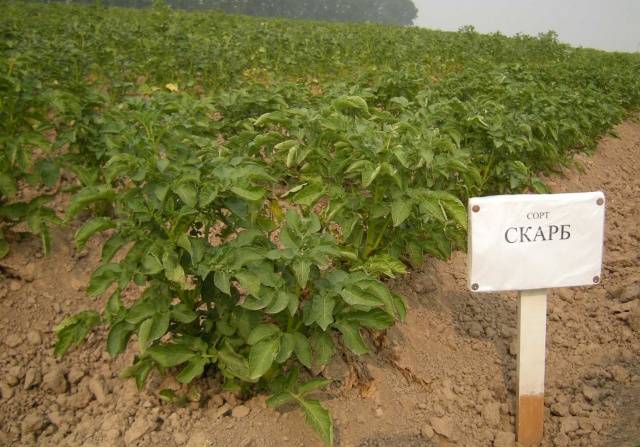
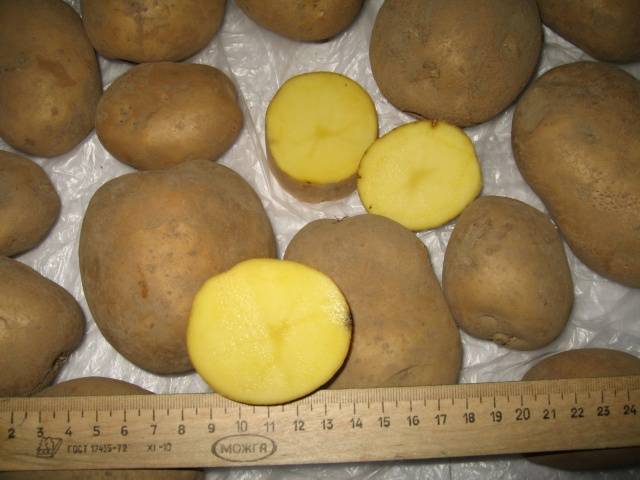
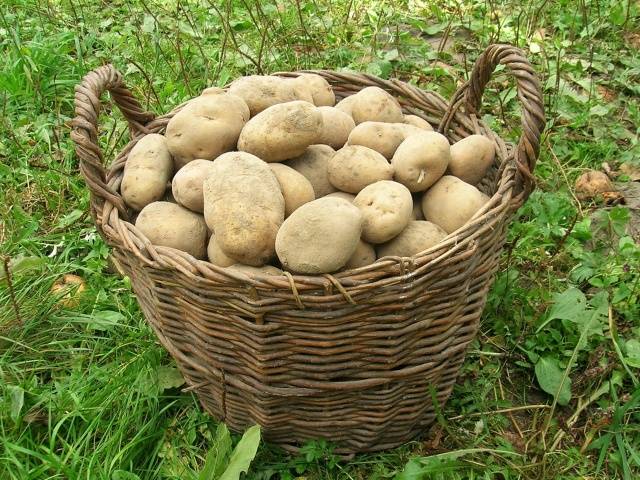
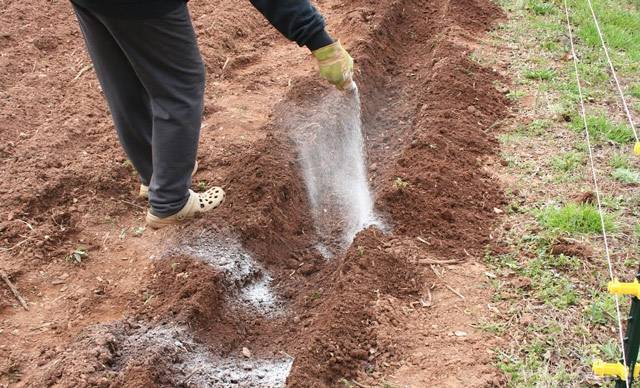
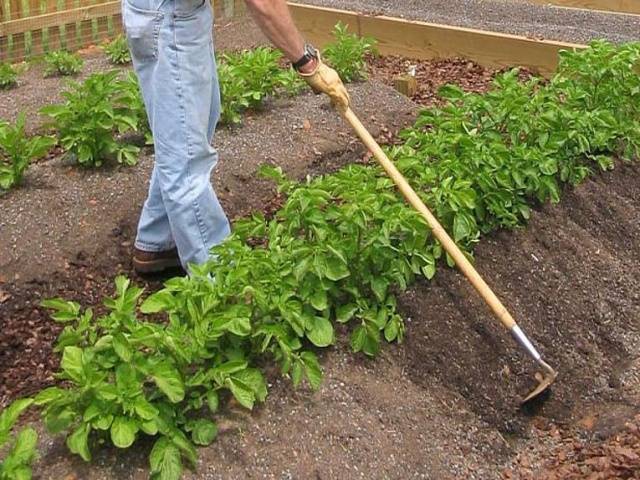
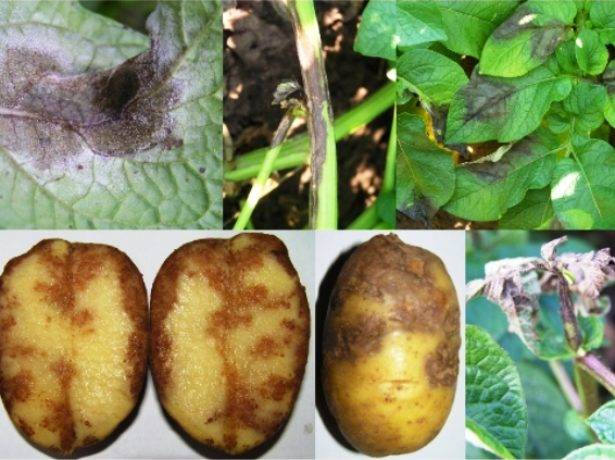









We bought an elite SKARB. All bushes are abundantly affected by late blight. We will not plant any more.